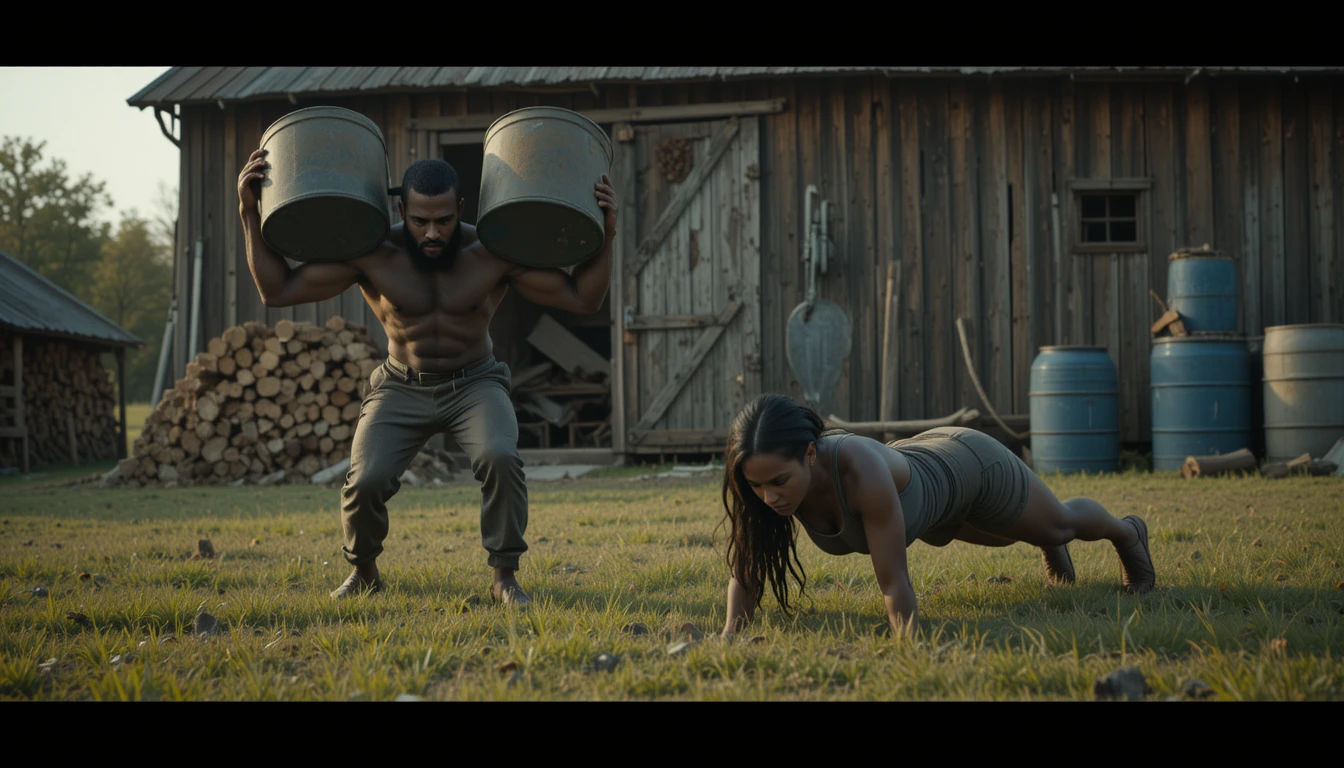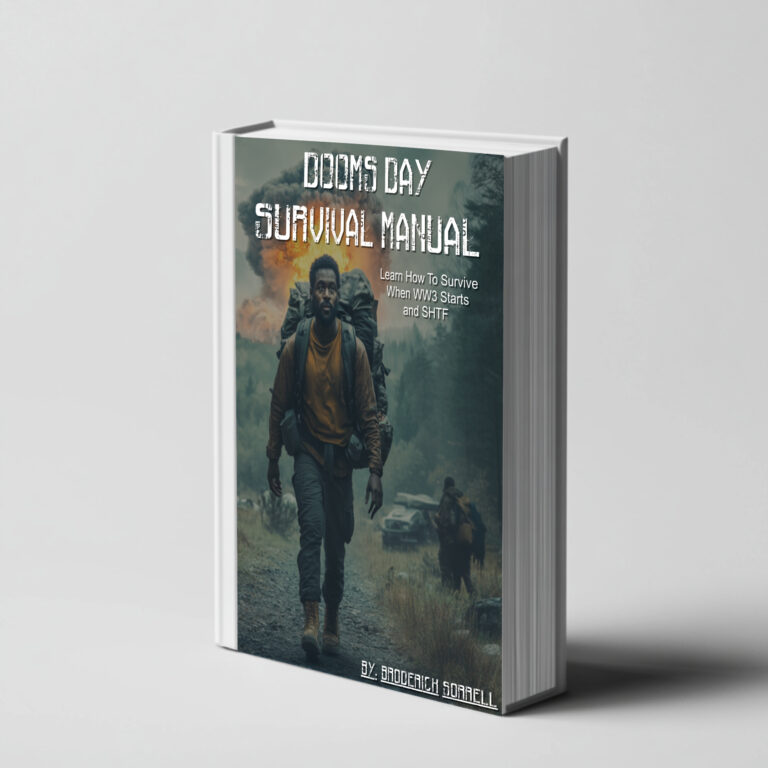

Popular
The 15 Best No-Gym Exercises for Preppers & Homesteaders
Training Secrets for Survival (No Gym Necessary)
Most people think “getting in shape” means joining a gym, buying overpriced leggings, and taking mirror selfies with a protein shake.
Cool — until you’re 20 miles from the nearest Planet Fitness and the only thing chasing you is a pack of coyotes.
If you’re a prepper or a homesteader, your body is your survival tool. Not the $300 tactical backpack. Not the shiny AR you saw in a YouTube video. YOU.
And if your “fitness plan” is just carrying in the groceries in one trip, good luck when you actually have to run a mile with a water jug on your shoulder.
Survival doesn’t care about your bench press PR. It cares if you can sprint to the treeline before anyone spots you, climb a fence without breaking your ankle, or haul 50 pounds of gear uphill without crying. That’s the kind of training we’re talking about today.
And the best part? You can do it all without a gym membership, a barbell, or even shoes if you want to go full feral.
1. Farmer Carries (a.k.a. “Get Used to Carrying Heavy Stuff”)
You’re going to be hauling water buckets, feed bags, firewood, or maybe your buddy who didn’t listen when you said don’t step there.
How to do it: Grab literally anything heavy with a handle — buckets, jugs, bags, logs — and walk it from point A to point B.
Why it matters: Builds grip strength, core stability, and stamina for moving real-world loads. In a survival setting, carrying is more useful than curling.
Pro tip: Start with moderate weight and longer distances. Progress to heavier weight and rough terrain. Bonus points for doing it barefoot like a true savage.
2. Squats (a.k.a. “Stop Skipping Leg Day”)
If your legs give out halfway up the hill, no one’s coming back down for you. Squats build the raw power you need for lifting, climbing, and sprinting.
How to do it: Stand with feet shoulder-width apart, lower your hips like you’re sitting on an invisible toilet, and push back up. Keep your heels down and core tight.
Why it matters: Strong legs are non-negotiable for hiking with gear, building shelters, or working long days in the field.
Survival twist: Try “weighted” squats with a backpack full of canned goods or your least cooperative goat.
3. Push-Ups (a.k.a. “Upper Body for Real Life”)
Push-ups train your chest, shoulders, triceps, and core — all crucial for climbing, pushing obstacles, or defending yourself.
How to do it: Hands under shoulders, body straight, lower until your chest almost touches the ground, push back up.
Why it matters: You can’t pull yourself over a wall if your arms have the tensile strength of spaghetti.
Challenge: Try incline push-ups on a log or decline push-ups with your feet on a stump for extra resistance.
4. Pull-Ups (or Row Variations if You Can’t Yet)
In a survival situation, you’re going to need to climb — trees, fences, ledges, whatever’s between you and safety.
How to do it: Find a sturdy branch, bar, or beam. Grip it, hang, and pull until your chin clears the bar. Lower slowly.
No bar? Use a table edge for bodyweight rows, or loop a rope over a tree limb for rope pulls.
Why it matters: Pulling strength is pure utility — it’s what gets you out of a ditch or up into a deer stand.
5. Dead Hangs & Grip Work
You can have all the muscle in the world, but if you can’t hang onto your gear, tool, or ledge, it’s game over.
How to do it: Hang from a branch or bar as long as possible. Try farmer carries with heavier objects for extra grip training.
Why it matters: Strong hands keep you alive — from climbing to swinging tools to restraining a door during a storm.
6. Sprints (a.k.a. “Outrun the Problem”)
Sometimes survival means moving fast — from incoming storms to incoming trouble.
How to do it: Pick a distance (30–100 meters) and go full speed. Rest and repeat.
Why it matters: Builds explosive power, lung capacity, and the ability to cover ground in a hurry.
Reality check: Jogging 3 miles won’t prepare you for a short, all-out sprint with your life on the line. Do both.
7. Crawls (Bear, Army, Crab — Pick Your Flavor)
You might need to move low under smoke, brush, or gunfire. Crawling builds mobility, coordination, and functional strength.
How to do it: Bear crawl on all fours with your knees off the ground. Army crawl flat with elbows and forearms.
Why it matters: It’s not glamorous, but neither is being visible to a threat.
Fun addition: Add weight on your back to simulate carrying gear.
8. Step-Ups & Lunges
Hiking hills, climbing into trucks, and stepping over logs all require unilateral leg strength and balance.
How to do it: Find a stump, rock, or step. Step up, drive through the heel, step down. Lunges work similarly in place or walking.
Why it matters: Prevents knee injuries and improves stability — crucial when terrain gets nasty.
9. Planks & Core Work
If your core is weak, your back will pay the price. Planks, side planks, and rotational core work keep you stable under load.
How to do it: Forearms down, body straight like a board, hold as long as possible.
Why it matters: Strong core = better posture, less fatigue, and more power in every movement.
Survival upgrade: Try “ruck planks” with a loaded backpack.
10. Jumping Drills (Broad Jumps, Box Jumps, Side Hops)
Explosiveness isn’t just for athletes — you might need to jump across gaps, over ditches, or out of the way fast.
How to do it: Practice broad jumps for distance, box jumps for height, and side hops for agility.
Why it matters: Power in your legs is a literal lifesaver.
Safety note: Land softly to protect your knees.
11. Log or Stone Lifts
Nature doesn’t make dumbbells, but it makes plenty of heavy, awkward objects.
How to do it: Squat down, grip your log/stone, lift with your legs, not your back.
Why it matters: Prepares you for moving debris, firewood, or livestock feed.
Extra credit: Carry it for distance after lifting.
12. Balance & Agility Drills
Walking on uneven terrain is its own workout. Train balance now to avoid ankle injuries later.
How to do it: Practice walking along logs, rocky creek beds, or makeshift beams.
Why it matters: Balance keeps you upright in bad conditions and improves coordination for everything else.
13. Mobility & Stretching
Being stiff isn’t just uncomfortable — it slows you down and makes you more injury-prone.
How to do it: Daily dynamic stretches for hips, shoulders, and back. Add yoga-style holds for deep flexibility.
Why it matters: You want to move like a wildcat, not a rusty gate.
14. Burpees (Sorry, Not Sorry)
Yes, they’re awful. Yes, they work. Burpees hit full-body strength, cardio, and coordination in one movement.
How to do it: From standing, squat down, kick feet back, do a push-up, jump back up. Repeat until you question your life choices.
Why it matters: Builds endurance, power, and mental toughness — the “don’t quit” muscle.
15. Carry & Drag Drills
Whether it’s hauling a wounded buddy or moving supplies, sometimes you drag, sometimes you carry.
How to do it: Use sandbags, logs, or even an old tire. Carry over one shoulder, drag with both hands.
Why it matters: Builds practical, real-world strength.
Conclusion
Being “fit” for survival isn’t about looking like an Instagram model. It’s about being able to work — climb, carry, sprint, crawl, and keep going when your body’s screaming at you to stop.
These exercises don’t need fancy equipment, special shoes, or a motivational playlist. They just need you, a patch of dirt, and the will to get it done.
Because when the time comes, no one’s going to care about your six-pack. They’re going to care whether you can keep up, pull your weight, and survive.
SUBSCRIBE ON YOUTUBE
FOLLOW ON SPOTIFY
ADVERTISEMENT
ADVERTISEMENT
ADVERTISEMENT
ADVERTISEMENT
VISIT ME ON YOUTUBE!
RELATED POST
Social Networks
- B.Roc Survival Podcast
- Discord
- Patreon
- Youtube
Links List
B.Roc Survival Inc.
All rights reserved











